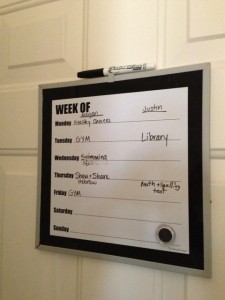 On any given day we need to remember a ton of things: what to get at the grocery store, take our vitamins, brush our teeth, call someone, email someone else, send a birthday card, etc. How can we possibly remember everything that we need to do? In my humble opinion, it is virtually impossible to just ‘remember’ everything that we need to do. So, if you are relying only on your brain to remember everything that you need to remember, you are setting yourself up for failure.
On any given day we need to remember a ton of things: what to get at the grocery store, take our vitamins, brush our teeth, call someone, email someone else, send a birthday card, etc. How can we possibly remember everything that we need to do? In my humble opinion, it is virtually impossible to just ‘remember’ everything that we need to do. So, if you are relying only on your brain to remember everything that you need to remember, you are setting yourself up for failure.
Here are some of my tips to keep you organized and looking like you remember everything with ease!
1. Have a central calendar. By this, I mean have a calendar that has ALL of your information on it. It doesn’t necessarily need to be in a central location, although that would be preferable. This calendar should contain all the appointments, birthdays or events that are happening at a specific time in the future. Tip 1a of this is: You need to check the calendar at least once per day.
2. Write it down. If you are busy and most of us are, don’t rely on your brain to remember something you were thinking of as you fell asleep by the time you wake up in the morning. Keep a note pad by your bed, in the kitchen, in the car or wherever you have thoughts OR, if you are techno savvy, make the notes on your phone or tablet.
3. Set alarms or timers. If there are certain things that need to happen at a certain time, set an alarm or timer. Most of us are not very good a judging time, so this will ensure you are punctual. This could be for picking up Johnny from school, taking medications or baking something in the oven. You can use a manual timer, your calendar program on your computer or there are several apps where you can set alarms or reminders. My favorite is Alarmed. You can set alarms with multiple reminders. Have to make an important dinner and you are notorious for trying to get ‘one more thing done before you leave’, you can set it to chime 30 minutes before, 15 minutes before, 10 minutes before to really light a fire under you to get out the door on time. There is an upgrade from the free version for $1.99 that will allow you to repeat reminders throughout the day to get up and stretch every hour or drink your water.
4. Make lists of other’s good ideas. We have all had those conversations where your friend tell you about the great movie, book, restaurant, wine, etc that you MUST watch/try/read. You think it is a great idea and can’t wait to take their advice. The problem is that the minute you get home you have already forgotten what restaurant/book/wine you were supposed to remember. This is what I think Evernote or SpringPad apps are perfect for. I have a ‘notebook’ in SpringPad for each of these great categories and every time someone tells me about their great idea, I have someone to put it AND somewhere to look when I want a new movie, wine, restaurant, etc. I also have a notebook for gift ideas, so that if I see something when I am out and about, I can log it in.
5. Make checklists. If you are someone that needs a checklist to get out the door in the morning, pack a suitcase or complete a project, then make one. You can do it on paper,in a word document or on an app like paperless lite, reminders, toodledo. This way you can set up a check list once and reset it each time you need it without starting from scratch.
6. Create visual reminders. If you absolutely CAN’T leave the house in the morning without the really important work file, put a giant note on the door leading out of your house reminding you to get the file. It is not silly to have a giant note on your door. It IS silly to forget the really important work file. I have a weekly reminder of my kids daily activities where they need extra items for school and it is on the door to my garage. It is easy for the kids and me to check the board before we leave the house to ensure we haven’t forgotten the gym shoes, library books or special projects (see picture). It is dry erase, so it can be easily changed for schedule changes.
Remembering details, being prompt for appointments, sending timely emails or calling someone on their special day makes everyone in your life feel respected and cared for. Remembering to take necessary medications, test blood sugar and eat on a regular schedule can prevent unnecessary side effects of chronic illnesses. Taking the time to put systems in place will help you take better care of yourself and those around you. It will also reduce your stress knowing that you don’t have to ‘remember’ everything!
If you liked today’s post, you’re welcome to use it in your own ezine or blog as long as you include the following blurb: Certified Professional Organizer, Tara Donohue Rudo, CPO, helps families, solopreneurs and mompreneurs focus on what is important. Get her FREE weekly tips and advice at www.NoMorePiles.com.

